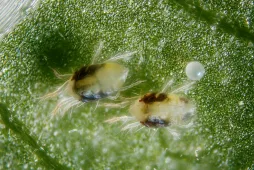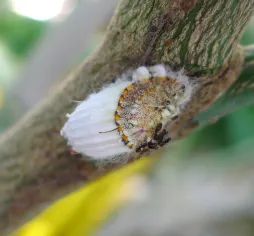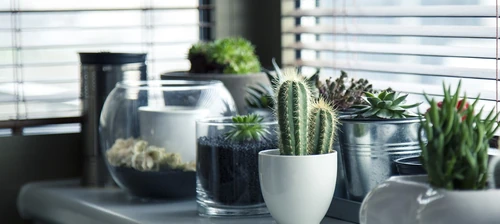Alocasia reginula 'Black Velvet', a treasure of nature
The jungles of Borneo never cease to amaze! In 2004, explorers discovered wild Alocasia "'Black Velvet"! The plant had been cultivated by horticultural enthusiasts since the 1970s. And many botanists thought it was a cultivar, a man-made variety based on alocasia reginula.
How to recognize Alocasia reginula 'Black Velvet'?
Alocasia reginula 'Black Velvet' is an evergreen perennial. Averaging 30 cm in height, it has an upright habit.
Short stems grow from a tuberous rhizome. They are extended by a long, light-green stalk.
Each petiole supports a thick, velvety leaf. The heart-shaped blades measure up to 15 cm long. Dark green, almost black, they are crossed by pale green or cream veins.
Alocasia 'Black Velvet' is grown for its decorative foliage. But it can also bloom! When it does, it is adorned with a yellow spathe surrounding a white spadix.
Alocasia 'Black Velvet' can only be appreciated with the eyes. The plant's sap contains a toxic substance: calcium oxalate crystals. They cause digestive disorders and mucous membrane inflammation when ingested. Cats are particularly sensitive. They can also cause skin irritation. Be sure to keep your specimen out of reach of your pets, and wear gloves when trimming.
Our maintenance tips
Alocasia 'Black Velvet are not plants to be placed in everyone's hands. They need light, rich soil, a little knowledge and a lot of attention.
Watering
In the wild alocasia 'Black Velvet benefit from high humidity. In pots, water when the surface of the substrate is dry, over a centimetre or so.
Water from the top with room-temperature rainwater. If you don't have any, you can use filtered water. Avoid mains water, which is often too hard.
Your Alocasia 'Black Velvet likes humidity, but hates having its roots immersed in water. After watering, empty any stagnant water from the cup or planter.
Spray
Your Alocasia 'Black Velvet is a tropical plant. It appreciates a high degree of humidity. To keep it happy, mist its foliage with non-calcareous water, such as rainwater or filtered water.
Fogging isn't just good for humidity. It also prevents pest attacks and cleans the leaves.
Repotting
In spring, transfer your Alocasia reginula 'Black Velvet' to a larger pot, so that it can continue to grow.
In a pierced pot, pour clay balls or small pebbles to optimize drainage. Then pour in a layer of ordinary potting soil enriched with a little perlite or river sand. Plant your Alocasia 'Black Velvet, fill in with substrate and tamp.
Water to eliminate air bubbles and improve contact between roots and soil.
Fertilization
You can stimulate the development of your plant during its growth phase, in spring and summer, with fertilizer.
Stimulate the growth of your Alocasia 'Black Velvet with green plant fertilizer.
Cleaning
Dust accumulating on the leaves slows down the photosynthesis process. To keep your Alocasia 'Black Velvet growing, clean the leaf blades with a damp sponge.
Remember that alocasia 'Black Velvet are toxic. Wear gloves or wash your hands after handling your plant.
Remember that alocasia 'Black Velvet are toxic. Wear gloves or wash your hands after handling your plant.
Cutting
Cutting is carried out during the strong growth phase, generally in spring and early summer.
Take the shoots that form at the base of your Alocasia 'Black Velvet. The larger they are, the greater the chances of success. Choose shoots with several leaves.
Cut off the new plant and its roots with a clean, sharp blade.
Prepare buckets with potting soil similar to that used for adult plants. Translucent pots are best. You'll be able to monitor root growth.
Place the bulbils on the surface, flat side down and pointed side up. Water and then place your bulbils in a greenhouse or transparent crate.
Diseases / Threats
Information
| Family | Araceae - Araceae |
| Type | Alocasia - Alocasia |
| Species | Alocasia reginula - Alocasia reginula |
| Lifecycle | Perennial |
| Foliage | Evergreen |
| Exposure | |
| Substrat | |
| Planting methods |
In pots In tubs |
| Categories | |
| Tag |
Toxic |
| Origin |
Southeast Asia |
| Hardiness (USDA) | 11b |
| Leaf color |
|
| Flower color |
|
| Fruit color |
|
Discover plants from the same family
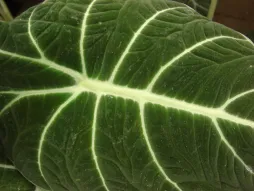
Alocasia reginula
Discover
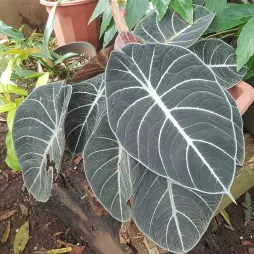
Alocasia 'Ninja
Discover
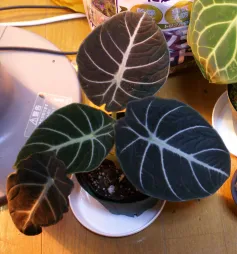
Alocasia 'Black Ninja
Discover
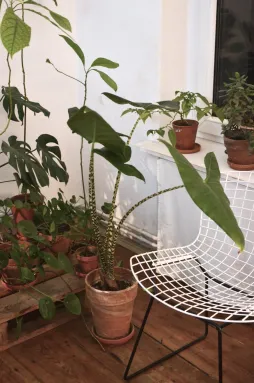
Alocasia zebrina
Discover










